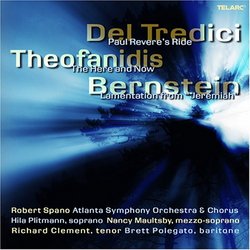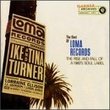| All Artists: Leonard Bernstein, David Del Tredici, Christopher Theofanidis, Robert Spano, Brett Polegato, Nancy Maultsby, Hila Plitmann, Richard Clement, Atlanta Symphony Orchestra Chorus Title: Del Tredici: Paul Revere's Ride; Theofanidis: The Here and Now; Bernstein: Lamentation Members Wishing: 0 Total Copies: 0 Label: Telarc Original Release Date: 1/1/2005 Re-Release Date: 10/25/2005 Genre: Classical Styles: Opera & Classical Vocal, Symphonies Number of Discs: 1 SwapaCD Credits: 1 UPC: 089408063824 |
Search - Leonard Bernstein, David Del Tredici, Christopher Theofanidis :: Del Tredici: Paul Revere's Ride; Theofanidis: The Here and Now; Bernstein: Lamentation
 | Leonard Bernstein, David Del Tredici, Christopher Theofanidis Del Tredici: Paul Revere's Ride; Theofanidis: The Here and Now; Bernstein: Lamentation Genre: Classical
|
Larger Image |
CD DetailsSimilar CDs |
CD ReviewsNot masterpieces, but good music Samer T Ismail | Danbury, CT | 05/14/2007 (5 out of 5 stars) "This CD is a bit tough to review, since most of the CD consists of world premieres of two works, Christopher Theofanidis' "The Here and Now" and David Del Tredici's "Paul Revere's Ride." The only reference point here to other recordings is the middle section, the "Lamentations" from Bernstein's Jeremiah Symphony. Nancy Maultsby performs without the over-the-top histrionics that mar some performances, and the ASO performs admirably. Of the two premieres, "Paul Revere's Ride" is probably the less impressive of the two works from a musical perspective; the work is a bit "gimmicky," relying on police sirens and recorded birdsong, among other things. Nevertheless, Hila Plitmann, for whom Del Tredici wrote the work, does a rather impressive job conveying the thrills Longfellow hoped his words would inspire. (After hearing it a few more times, though, I have come to appreciate the work a bit more for its use of motifs and themes, and the sheer difficulty of the parts.) My personal favorite of the three works is the opening piece, "The Here and Now," which is a setting of poems by Rumi. Perhaps the most impressive Rumi setting, from a musical standpoint, is Szymanowski's Third Symphony, "Song of the Night" (a work definitely worth exploring if you're a fan of Rumi), and it's no shame to say that Theofanidis doesn't quite reach the lofty pinnacle set by that work. But his work is nevertheless an artful assembly of Coleman Barks' translation. More so than "Paul Revere's Ride," this piece contains beautiful melodies that will stay with you long after the work ends: I frequently find myself singing the climactic duet, "The urgency of love." (Structurally, and somewhat musically, this piece is similar to Samuel Barber's setting of Pablo Neruda's poems in The Lovers; fans of one will probably like the other, as well.) If you're not a fan of "new music," you may not like this disc. But if you're a fan of the ASO and its work, it's definitely worth a listen. " Major New Choral Works Worth Hearing Christopher J. Hoh | Arlington, VA, USA | 08/25/2007 (4 out of 5 stars) "Christopher Theofanidis's "The Here and Now" is dramatic, exciting, idiomatic. Overall, excellent writing that shows off the chorus and instruments, very well performed. The texts are terrific. Kudos to conductor Robert Spano and the Atlanta Symphony and Chorus for commissioning it and giving is such a good showing. I agree with the reviewer who compared it to Barber's "The Lovers," but would add that musically it also stands up well against Bernstein's Chichester Psalms despite its secular (profane?) texts. At the same time, Theofanidis's sound is fresh without being gimmicky. Will it become a standard masterwork in the 21st century repertoire? It's certainly a candidate, one that orchestra/chorus programmers and contemporary choral afficionados should explore. "Paul Revere's Ride" by David DelTredici is a welcome addition, if not quite as compelling. He knows his way around a chorus and orchestra too, so the piece is always interesting. I'd take issue with calling some of the musical moments "silly." He wrote "light-hearted" touches that provide a good antidote to the hagiography surrounding Longellow and Paul Revere. (I say this as a Longfellow fan and as a skeptic of orchestral sirens.) Both pieces are extended -- over 25 minutes -- with satisfying structure of movements and intriguing variety in mood and sound. Inclusion here of the Bernstein excerpt -- "Lamentation" for mezzo and orchestra concludes his famous first symphony -- is problematic. It's unquestionably an impressive, moving and historically significant piece, especially coming at the outset of Bernstein's career and having helped launched it. Maybe Spano wanted to highlight continuity of tradition between Bernstein in '43 and these "new" composers six decades later. Or perhaps the producers wanted something calm and somber to cleanse the aural palate between the other works. But why not something that has not been so widely recorded already? Soloist Nancy Maultsby's wide vibrato did not help make this selection a respite either. Still, people who like big chorus and orchestra music or new compositions should audition this disc."
|

 Track Listings (20) - Disc #1
Track Listings (20) - Disc #1
